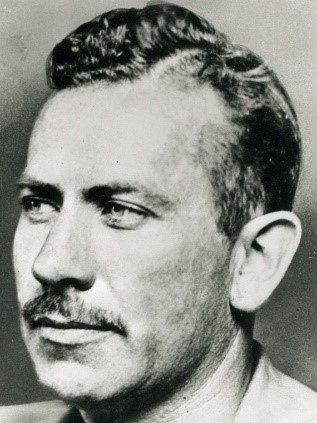At heart of the biblical narrative, both in the Hebrew and Greek testaments, are two related fundamental revelations: the nature of man and the nature of freedom. Judeo-Christian theism reveals that human beings are made in the image of God.
Then God said, “Let us make man in our image, after our likeness. And let them have dominion over the fish of the sea and over the birds of the heavens and over the livestock and over all the earth and over every creeping thing that creeps on the earth.”
So God created man in his own image,
in the image of God he created him;
male and female he created them.
And God blessed them. And God said to them, “Be fruitful and multiply and fill the earth and subdue it, and have dominion over the fish of the sea and over the birds of the heavens and over every living thing that moves on the earth.” Genesis 1:26-28
Human beings are made in the image of God and given the mandate to steward the earth. (Go here for further reading on the image of God in man.) This stands in contrast to the atheist’s understanding that we are merely animals, or even worse, machines. It also stands in contrast with the animist’s understanding that only the spiritual realm is real and a human being is simply a ghost inhabiting an animal body.
Freedom
In addition to this the Bible asserts that man is a free moral agent. We see this in Genesis 2:15-17 where Adam, the first man, is told by God that he may eat of any tree in the garden except one, the tree of the knowledge of good and evil. This could be called freedom’s tree because it establishes mankind’s free moral agency – timshol.
The Lord God took the man and put him in the garden of Eden to work it and keep it. And the Lord God commanded the man, saying, “You may surely eat of every tree of the garden, but of the tree of the knowledge of good and evil you shall not eat, for in the day that you eat of it you shall surely die.”
At the tree of the knowledge of good and evil human beings choose between affirming God or being their own god.
At freedom’s tree real choices are made and real responsibility given. In Genesis 2, the choice is to obey God and abstain, or to disobey God and eat. The free, uncoerced choice to eat from the tree of the knowledge of good and evil brought evil into the world. It affirms timshol, the Hebrew term meaning “you may choose!”
As John Steinbeck understands it, after the fall we choose between embracing sin or denying sin, choosing internal self-government or lawlessness, putting chains on your passions or letting them enslave you. We can fight against the three forms of evil—moral, natural and institutional—or we can live under the reign of evil. (For more on this go here.)
What is a human?
Steinbeck captures the significance of the biblical revelation on the wonder of what it means to be human, when he speaks these words through the mouth of the servant Lee reflecting on the Hebrew timshol:
And I feel that I am a man. And I feel that a man is a very important thing—maybe more important than a star. This is not theology. I have no bent toward gods. But I have a new love for that glittering instrument, the human soul. It is a lovely and unique thing in the universe. It is always attacked and never destroyed— because “Thou mayest.”
At the heart of the biblical narrative is that human beings are free moral agents made in the image of God. Thou mayest!
As Steinbeck has said:
But the Hebrew word, the word timshel [note the variant spelling]—“Thou mayest”— that gives a choice. It might be the most important word in the world. That says the way is open. That throws it right back on a man. For if “Thou mayest”—it is also true that “Thou mayest not.”
The message of this Hebrew word timshol stands in contrast to both modern, atheistic man and postmodern, animistic man. Modern man functions on a kind of scientific determinism that says we are not free, our behavior is established by chemical and biological impulses. We are predetermined to certain behaviors and lifestyles. “I was made this way” is a modern mantra. Postmodernism neo-paganism bows to the stars or the “gods” that determine our destiny.
A current distortion
Such distortion of truth has harmful consequences in the real world. Scott Allen writes about the determinism of much of the social justice movement.
While the biblical worldview affirms a human nature and a human identity that transcend race, gender, and culture, the new religion [ideological social justice] provides no such foundation. In this view, all our choices and behaviors are determined by our community—our identity group. There is no basis for personal freedom, personal responsibility, or personal accountability …
Consider the fact that higher percentages of black students than white students are expelled from Saint Paul, Minnesota, public schools. The superintendent, following the reasoning of social justice, has concluded that this disparity is incontrovertible proof of systemic racism.
 But is it possible that the actions of the black students themselves might play a role? Social justice ideology, of course, forbids this kind of thinking. Bad outcomes must never be blamed on personal choices or behaviors. This is “blaming the victim”—a cardinal sin. Blame must always be attributed to social, systemic, and institutional causes outside of human control. So the superintendent placed an arbitrary cap on the number of black students who could be expelled, without regard to the actions of the students. The result, predictably, was “chaos.”
But is it possible that the actions of the black students themselves might play a role? Social justice ideology, of course, forbids this kind of thinking. Bad outcomes must never be blamed on personal choices or behaviors. This is “blaming the victim”—a cardinal sin. Blame must always be attributed to social, systemic, and institutional causes outside of human control. So the superintendent placed an arbitrary cap on the number of black students who could be expelled, without regard to the actions of the students. The result, predictably, was “chaos.”
Heather MacDonald of the Manhattan Institute notes that while African Americans comprise less than a fourth of New York City’s population, they account for half of all police pedestrian stops, a disparity that leads many to charge that the police force is institutionally racist. Not so fast, MacDonald says. “We are very reluctant to ascribe agency to blacks, or any other victim group … the problems are all structural—white racism, white privilege, white supremacy, etc. But this infantilizes blacks. It essentially says ‘there is nothing you can do for yourselves.’”
History is something you make
This is fatalism. History is something that happens to you! We are determined by our genes, by the fates or our victim class. These ideas purport that blacks are victims; it denies their basic humanity, that they “may choose” – timshol. This is tragic or perhaps I should say, it is diabolical.
The biblical view affirms that history is something you make.
Steinbeck summarizes the grand discovery:
Here is individual responsibility and the invention of conscience. You can if you will but it is up to you. This little story (from the Bible) turns out to be one of the most profound in the world. I always felt it was, but now I know it is.
Timshol – thou mayest! The Hebrew word that changed the world.
- Darrow Miller







2 Comments
William Warren
May 11, 2020 - 9:45 amAm I a sinner because I sin or do I sin because I am a sinner. I would be very careful of looking to Denis Prager and John Steinbeck for moral wisdom which can only come from God and His Word. For as Paul said if righteousness comes through the Law, then Christ died in vain. Yes, we are responsible for our choices and will be held accountable, for God is not the author of sin. But I think the understanding of free will and Divine Sovereignty lies a whole lot deeper than theses posts suggest.
admin
May 13, 2020 - 5:00 amOf course William! We could have a very long and profound discussion over these things. My guess is, from what little you have said here, we may be close to an agreement. The point of these blogs was not to get into a deep and profound theological discussion, but to simply point out that one of the wonders of our being made in the image of God is that we are free moral agent. We are not to live as fatalists of either an Animistic or Atheistic variety.
Thanks for writing.